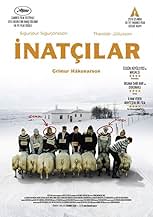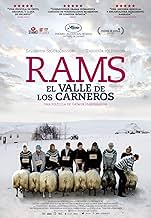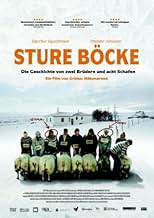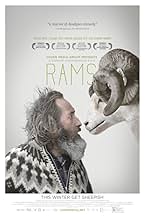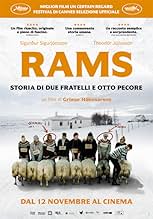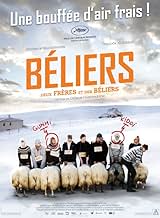CALIFICACIÓN DE IMDb
7.2/10
15 k
TU CALIFICACIÓN
En un remoto valle agrícola islandés, dos hermanos que llevan 40 años sin hablarse tienen que unirse para salvar lo que más quieren: sus ovejas.En un remoto valle agrícola islandés, dos hermanos que llevan 40 años sin hablarse tienen que unirse para salvar lo que más quieren: sus ovejas.En un remoto valle agrícola islandés, dos hermanos que llevan 40 años sin hablarse tienen que unirse para salvar lo que más quieren: sus ovejas.
- Dirección
- Guionista
- Elenco
- Premios
- 31 premios ganados y 14 nominaciones en total
- Dirección
- Guionista
- Todo el elenco y el equipo
- Producción, taquilla y más en IMDbPro
Opiniones destacadas
'Rams' is a delightful film, for several reasons.
First, it shows the traditional way of living at the remote Icelandic countryside, a harsh environment where only sheep and stubborn bearded men seem to be able to survive. The beautiful landscape and the traditional farming community are a wonderful setting for this film.
Secondly, it tells a story with so much nice little details, that it's hard not to like it. It's about two brothers who live a few hundred meters from each other but haven't spoken to each other for 40 years. They communicate, if necessary, by writing letters which are carried from one house to the other by a sheepdog. When their flocks of expertly bred sheep are diagnosed with a deadly disease, their lives are turned upside down.
Thirdly, it is a bittersweet drama with a very positive feeling to it. There are many funny moments, filled with the typical deadpan Scandinavian humour. When one of the brothers finds the other lying motionless in the snow, drunk and possibly freezing to death, he picks him up with a large mechanical shovel, deposits him in front of a nearby hospital, and leaves without even getting out of his machine. But as much as they detest each other, the circumstances make an emotional cease-fire inevitable.
This is one of those little gems that deserve to make it to the final selections of the foreign language Oscars. 'Rams' was submitted by Iceland, but not selected for the final shortlist. What a pity.
First, it shows the traditional way of living at the remote Icelandic countryside, a harsh environment where only sheep and stubborn bearded men seem to be able to survive. The beautiful landscape and the traditional farming community are a wonderful setting for this film.
Secondly, it tells a story with so much nice little details, that it's hard not to like it. It's about two brothers who live a few hundred meters from each other but haven't spoken to each other for 40 years. They communicate, if necessary, by writing letters which are carried from one house to the other by a sheepdog. When their flocks of expertly bred sheep are diagnosed with a deadly disease, their lives are turned upside down.
Thirdly, it is a bittersweet drama with a very positive feeling to it. There are many funny moments, filled with the typical deadpan Scandinavian humour. When one of the brothers finds the other lying motionless in the snow, drunk and possibly freezing to death, he picks him up with a large mechanical shovel, deposits him in front of a nearby hospital, and leaves without even getting out of his machine. But as much as they detest each other, the circumstances make an emotional cease-fire inevitable.
This is one of those little gems that deserve to make it to the final selections of the foreign language Oscars. 'Rams' was submitted by Iceland, but not selected for the final shortlist. What a pity.
You don't have to have been to Iceland to appreciate Rams, but it certainly helps explicate the film's grizzled, deadpan sense of humour, or the mysterious, beguiling power resonating from their vast, otherworldly landscapes. Writer/director Grímur Hákonarson crafts a skeletally simple tale of a community of farmers caring for their sheep whose livelihood is threatened by an outbreak of Scrapie, and employs it as a parable for changing with the times, or the creative, belligerent lengths some will go to to avoid doing so.
Framed against the unyielding, jaw-dropping vistas of the Icelandic countryside, the (unexplained) conflict between the central two farmers, the spectacularly named Gummi (Sigurður Sigurjónsson) and Kiddi (Theodór Júlíusson), feels equally mythic and etched in fiery stone, with all communication done by note, or the occasional drunken gunshot. It's sometimes difficult to tell what's meant to be funny or sombre in their antics in coping with their isolation and the pending slaughter of their sheep, but Hákonarson embraces the intersection, allowing their impassive, tentative emotional ambiguity and unapologetic wackiness to tease out the tension between amusingly petulant actions and the hard life that's spawned them.
In fact, the film's main criticism is an increasing suspicion that the awe-inspiring impassivity of its stony plains and narrative alike overly inflates the sense of profundity therein. There's a primal elegance to the simplicity of Rams, but its scenario and central conflict are somewhat too familiar to not supplant with further scripting or characterization. Hákonarson's glacial pace, at first hypnotic and appropriate for the unyielding consistency of the farmers, becomes restless over time, making the film begin to feel sleepier when it should evidence an elegiac crescendo. Things perk up with a stormy and unexpectedly tender climax, but there's a larger breadth of untapped subtext which leaves the film feeling thoroughly pleasant, but flimsier than it should amidst such steadfast a landscape.
If nothing else, the film should be commended for the abilities of its cast to convey so much largely through solemn staring into the distance. Sigurður Sigurjónsson brings a craggy affability to protagonist Gummi, the crinkles of affection crawling across his normally desolate features as he caresses the wool of his prized sheep making it all the more moving as he comes to terms with the heartbreaking of their pending slaughter. As the crabbier estranged brother, Theodór Júlíusson tempers comedic blustering and haphazard nudity with an undercurrent of real hurt and loss. Both are so odd it's easy to understand how they'd connect so much easier with their sheep, but also the ferocious indignation with which they'll protect not only their individual animals, but their livelihood, lifestyle, and family legacy.
Rams, in its deliberate primal simplicity, may not offer all the answers to the questions it evokes, but in the hands of such raw,capable performers and the stunning, plaintive Icelandic vistas that Hákonarson films with such reverence, it's a deceptively engaging curiosity, and one worth weathering alongside its farmers. Just keep your clothes on, if at a public screening.
-7/10
Framed against the unyielding, jaw-dropping vistas of the Icelandic countryside, the (unexplained) conflict between the central two farmers, the spectacularly named Gummi (Sigurður Sigurjónsson) and Kiddi (Theodór Júlíusson), feels equally mythic and etched in fiery stone, with all communication done by note, or the occasional drunken gunshot. It's sometimes difficult to tell what's meant to be funny or sombre in their antics in coping with their isolation and the pending slaughter of their sheep, but Hákonarson embraces the intersection, allowing their impassive, tentative emotional ambiguity and unapologetic wackiness to tease out the tension between amusingly petulant actions and the hard life that's spawned them.
In fact, the film's main criticism is an increasing suspicion that the awe-inspiring impassivity of its stony plains and narrative alike overly inflates the sense of profundity therein. There's a primal elegance to the simplicity of Rams, but its scenario and central conflict are somewhat too familiar to not supplant with further scripting or characterization. Hákonarson's glacial pace, at first hypnotic and appropriate for the unyielding consistency of the farmers, becomes restless over time, making the film begin to feel sleepier when it should evidence an elegiac crescendo. Things perk up with a stormy and unexpectedly tender climax, but there's a larger breadth of untapped subtext which leaves the film feeling thoroughly pleasant, but flimsier than it should amidst such steadfast a landscape.
If nothing else, the film should be commended for the abilities of its cast to convey so much largely through solemn staring into the distance. Sigurður Sigurjónsson brings a craggy affability to protagonist Gummi, the crinkles of affection crawling across his normally desolate features as he caresses the wool of his prized sheep making it all the more moving as he comes to terms with the heartbreaking of their pending slaughter. As the crabbier estranged brother, Theodór Júlíusson tempers comedic blustering and haphazard nudity with an undercurrent of real hurt and loss. Both are so odd it's easy to understand how they'd connect so much easier with their sheep, but also the ferocious indignation with which they'll protect not only their individual animals, but their livelihood, lifestyle, and family legacy.
Rams, in its deliberate primal simplicity, may not offer all the answers to the questions it evokes, but in the hands of such raw,capable performers and the stunning, plaintive Icelandic vistas that Hákonarson films with such reverence, it's a deceptively engaging curiosity, and one worth weathering alongside its farmers. Just keep your clothes on, if at a public screening.
-7/10
I had the chance to watch Hrútar / Rams in a cinema in Reykjavik after traveling for 11 days in Iceland. Watching this movie was the highlight of our 2 day long stay in Reykjavik.
During the story we get to know a world that coexists with our modern Western world and of which we know nothing: elderly brothers taking care of and working with sheep.
While one shouldn't expect a Rambo-style Hollywood action movie, the pace is good, there are dramatic and comic scenes following each other in an easily-watchable way with nice shots and great acting (one doesn't think that he watches actors but real life).
I would have loved to have more insights on the life of shepherds and know more of the antecedents but the story told in the movie is a dramatic, full story while the movie is a very well done independent-type European movie.
During the story we get to know a world that coexists with our modern Western world and of which we know nothing: elderly brothers taking care of and working with sheep.
While one shouldn't expect a Rambo-style Hollywood action movie, the pace is good, there are dramatic and comic scenes following each other in an easily-watchable way with nice shots and great acting (one doesn't think that he watches actors but real life).
I would have loved to have more insights on the life of shepherds and know more of the antecedents but the story told in the movie is a dramatic, full story while the movie is a very well done independent-type European movie.
In an age of digital marketing saturation, social media domination and notifications of the latest Disney blockbuster being sent to you while you're sat on the loo, it's always refreshing to have a film sneak up unannounced and give you that warm fuzzy hidden gem feeling. Resembling its Icelandic counterparts, Rams is like finding a Sigur Ros in a big bag of Coldplays.
Rams follows two brothers who reside next door to each other in a remote sheep farming community in the Icelandic countryside. Having not spoken to each other for 40 years, Gummi (Sigurjónsson) and Kiddi (Júlíusson) are finally forced to deal with their strained relationship after a rare disease triggers the slaughter of their entire valleys flock. Each brother deals with the situation in his own way; Gummi having the functioning sibling role; calm and calculating with his understated intelligence and Kiddi with drink induced anger and violence.
As you would expect from a film based on the hillsides of Iceland, the scenery is stunning but is never used to build the crew's cinematography portfolio. In fact, it only adds to the evident toughness of the people's lives there, surviving a challenging livelihood with the backdrop of such natural splendour. The relationship between the farmers and their animals and how it intrinsically represents, and is inherently tied to, the entire history of their family is at times both heart-warming and heart- breaking.
What is most surprising about Rams is how it creeps up on you; how you find yourself sincerely caring for its characters towards the end of the film. You genuinely feel for the brother's relationship yet the script is so subtle in its depiction of the association between the two that the feeling comes as a real surprise when it finally hits. This is made even more remarkable considering how much of a slog the first thirty minutes are to get through.
There are sweet little comedy moments too. The brothers use a sheep dog to deliver notes to each other and at one point Gummi delivers a drunken Kiddi to the local A&E in the bucket of a digger, but these moments are infrequent and never feel like forced slapstick. The humour is always believable and acts as a nice break from the melancholy of the primary story.
Rams is a lovely surprise, a film that intentionally builds up slowly and is so understated in the development of its main characters that by the end of the film, you forget about almost everything else but the affection you have subconsciously developed for the two brothers. A sneaky little treasure of a movie whose ending will stay with you for a long time.
Rams follows two brothers who reside next door to each other in a remote sheep farming community in the Icelandic countryside. Having not spoken to each other for 40 years, Gummi (Sigurjónsson) and Kiddi (Júlíusson) are finally forced to deal with their strained relationship after a rare disease triggers the slaughter of their entire valleys flock. Each brother deals with the situation in his own way; Gummi having the functioning sibling role; calm and calculating with his understated intelligence and Kiddi with drink induced anger and violence.
As you would expect from a film based on the hillsides of Iceland, the scenery is stunning but is never used to build the crew's cinematography portfolio. In fact, it only adds to the evident toughness of the people's lives there, surviving a challenging livelihood with the backdrop of such natural splendour. The relationship between the farmers and their animals and how it intrinsically represents, and is inherently tied to, the entire history of their family is at times both heart-warming and heart- breaking.
What is most surprising about Rams is how it creeps up on you; how you find yourself sincerely caring for its characters towards the end of the film. You genuinely feel for the brother's relationship yet the script is so subtle in its depiction of the association between the two that the feeling comes as a real surprise when it finally hits. This is made even more remarkable considering how much of a slog the first thirty minutes are to get through.
There are sweet little comedy moments too. The brothers use a sheep dog to deliver notes to each other and at one point Gummi delivers a drunken Kiddi to the local A&E in the bucket of a digger, but these moments are infrequent and never feel like forced slapstick. The humour is always believable and acts as a nice break from the melancholy of the primary story.
Rams is a lovely surprise, a film that intentionally builds up slowly and is so understated in the development of its main characters that by the end of the film, you forget about almost everything else but the affection you have subconsciously developed for the two brothers. A sneaky little treasure of a movie whose ending will stay with you for a long time.
Love and hate have many things in common. Each, wrote Hawthorne, "leaves the passionate lover, or the no less passionate hater, forlorn and desolate by the withdrawal of his object." In the remote landscape of distant Iceland two neighbors, Gummi and Kiddi, nurse a fervent hatred. It has simmered for forty years running and despite the many things they have in common. Like many Icelanders, where there are more sheep (800,000) than people (300,000), they share a passion for sheep. Not THAT passionate! The calling to raise sheep is intertwined with their nature. The discovery of scrapie among the sheep, a lethal and highly contagious disease, should draw Gummi and Kiddi closer together. With the lengths they go to avoid each other, it is hard to see how much further they could be apart. Yet with true Icelandic spirit they try their best to maintain their independence and go their separate ways. The results are both hilarious and tragic.
The film is a typical Icelandic mix of darkness and light. The line is blurred between independence and isolation. The director maintains it is based on personal experience and real life situations. The themes of love and hate, as well as seclusion and self-reliance, really resonate with me. The two main characters are unique and intriguing as the film, and their parts are played well. Someone asked the director how hard it was to direct sheep and he replied that it was easier casting and directing sheep than people. Winner of the Un Certain Regard prize at Cannes. Seen at the Toronto International Film Festival 2015.
The film is a typical Icelandic mix of darkness and light. The line is blurred between independence and isolation. The director maintains it is based on personal experience and real life situations. The themes of love and hate, as well as seclusion and self-reliance, really resonate with me. The two main characters are unique and intriguing as the film, and their parts are played well. Someone asked the director how hard it was to direct sheep and he replied that it was easier casting and directing sheep than people. Winner of the Un Certain Regard prize at Cannes. Seen at the Toronto International Film Festival 2015.
¿Sabías que…?
- TriviaIt was selected as the Icelandic entry for the Best Foreign Language Film at the 88th Academy Awards. Ultimately, it was not nominated.
- Créditos curiososThe sheep are credited as actors.
- ConexionesReferenced in Film '72: Episode #45.3 (2016)
- Bandas sonorasÓður Til Sauðkindarinnar
(Poem)
Written by Þorfinnur Jónsson
Selecciones populares
Inicia sesión para calificar y agrega a la lista de videos para obtener recomendaciones personalizadas
- How long is Rams?Con tecnología de Alexa
Detalles
- Fecha de lanzamiento
- Países de origen
- Sitios oficiales
- Idioma
- También se conoce como
- Carneros: La historia de dos hermanos y ocho ovejas
- Locaciones de filmación
- Productoras
- Ver más créditos de la compañía en IMDbPro
Taquilla
- Presupuesto
- EUR 1,750,000 (estimado)
- Total en EE. UU. y Canadá
- USD 149,250
- Fin de semana de estreno en EE. UU. y Canadá
- USD 13,289
- 7 feb 2016
- Total a nivel mundial
- USD 1,826,583
- Tiempo de ejecución1 hora 33 minutos
- Color
- Relación de aspecto
- 2.35 : 1
Contribuir a esta página
Sugiere una edición o agrega el contenido que falta

Principales brechas de datos
By what name was Hrútar (2015) officially released in India in English?
Responda





